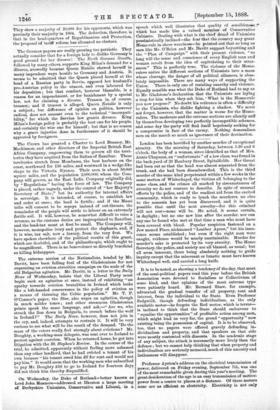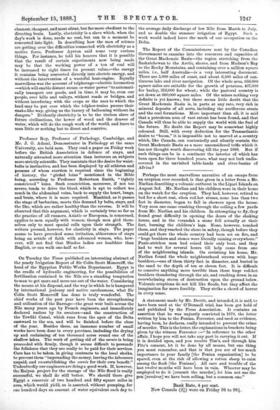Professor Ayrton's address on the electrical transmission of power, delivered
on Friday evening, September 7th, was one of the most remarkable given during this year's meeting. The great desideratum of the age is an easy transmission of motive- power from a centre to places at a distance. Of these motors none are as efficient as electricity. Electricity is not only cleanest, cheapest, and most silent, but far more obedient to the directing brain. Lastly, electricity is a slave which, when the day's work is done, needs no rest, but can in a moment be converted into light. In describing how the men of science are getting over the difficulties'comiected with electricity as a motive force, Professor Ayrton said some very curious things. For instance, he told his hearers that it is possible that the result of certain experiments now being made may be that the working power of a ton of coal will be increased to eight times its present value,—the energy it contains being converted directly into electric energy, and without the intervention of a wasteful heat-engine. Equally marvellous was the account of telpherage--eleetric locomotion —which will enable distant steam or water power " to automati- cally transport our goods, and in time, it may be, even our people, over hills and valleys, without roads or bridges, and without interfering with the crops or the uses to which the land may be put over which the telpher-trains pursue their snake-like way, giving us the luxury of ballooning without its dangers." Evidently electricity is to be the tireless slave of future civilisations, the hewer of wood and the drawer of water, which will do the rough work of the world, and leave to man little or nothing but to direct and contrive.



































 Previous page
Previous page